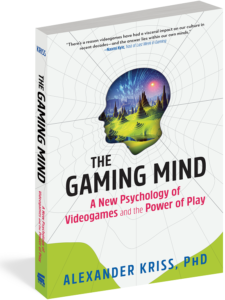 Are videogames bad for us? It’s the question on everyone’s mind, given teenagers’ captive attention to videogames and the media’s tendency to scapegoat them. It’s also—if you ask clinical psychologist Alexander Kriss—the wrong question.
Are videogames bad for us? It’s the question on everyone’s mind, given teenagers’ captive attention to videogames and the media’s tendency to scapegoat them. It’s also—if you ask clinical psychologist Alexander Kriss—the wrong question.
In his therapy office, Kriss looks at videogames as a window into the mind. Is his patient Liz really “addicted” to Candy Crush—or is she evading a deeper problem? Why would aspiring model Patricia craft a hideous avatar named “Pat”? And when Jack immerses himself in Mass Effect, is he eroding his social skills—or honing them via relationship-building gameplay?
Read on for an exclusive interview with Kriss on the psychology of videogames, the stigma surrounding them, and why he decided to write his book, The Gaming Mind, available now!
***
Why have games been such a big source of stigma and societal concern for so many years?
Games are still relatively new (as compared to books or films, say), and any new media can be easily targeted as a corruptive force, as it tends to attract young people and confuse their parents (think television or comic books in generations past). But stigma around games has been especially pernicious because of their interactivity—players don’t just consume this media but participate in it, and from the outside it can appear that they are devoting tremendous time and energy to something trivial and meaningless. The key to breaking the cycle of scientifically baseless alarmism is to recognize that games are not meaningless to the people who play them—in fact they can be vital windows into who someone is and what issues they are wrestling with
Should games addiction be treated as a mental illness?
The short answer is no. The long answer is that any diagnosis is only as useful as the treatment it indicates, and there is no consensus in the mental health community around how to treat so-called games addiction. I believe the term itself is also deeply misleading, as in my clinical experience the game is not the problem itself but the manifest expression of a deeper problem—the player is not “addicted” to the game but rather is trying to address some unresolved emotional issue through a compulsive relationship with the game.
What is one piece of advice you would give to a parent trying to better understand or set limits around videogames?
Talk to your kids about the games they play—and why. If you approach the subject of games from a judgmental or anxious place, it becomes harder to meet your children where they are and develop an understanding of what playing games means to them. Conversely, if there is a sense that you are not just trying to control your children’s behavior but to understand it, setting limits becomes an easier concept to discuss, justify, and implement.
Why did you decide to write a book about games and psychotherapy?
A big reason is that within the field of mental health—which is supposed to be founded on notions of curiosity and compassion—I found games to be often spoken and written about in dismissive or derisive ways. Even professionals, parents, and other interested parties who truly wanted to learn more about games and why people play them would tell me that they found any entry point to be inscrutable, and that most of what was out there seemed centered around polemic claims. I think that both games and psychotherapy have a tendency to be oversimplified, derided, or feared in mainstream discourse, and I hoped to bring them together in this book to demonstrate how possible and fruitful it can be to talk openly about subjects so often relegated to the shadows.
Does someone need to play games in order to understand them, or understand why someone in their life plays them?
On the one hand, I’d encourage anyone with a curiosity about games to dip their toes in the vast digital waters, perhaps starting with titles recommended or currently being played by loved ones. But you don’t have to be an avid player of games to have an appreciation of their potential and to remain interested in why people close to you play them. There are many titanically popular titles that I have limited familiarity with in terms of hands-on experience (Fortnite is a good example), but my overall comfort with the language of games makes it easy to speak to someone, whether a friend or a patient, about what that game means to them.
Interview with Alex Kriss, author of The Gaming Mind: A New Psychology of Videogames and the Power of Play (The Experiment, March 2020) theexperimentpublishing.com



